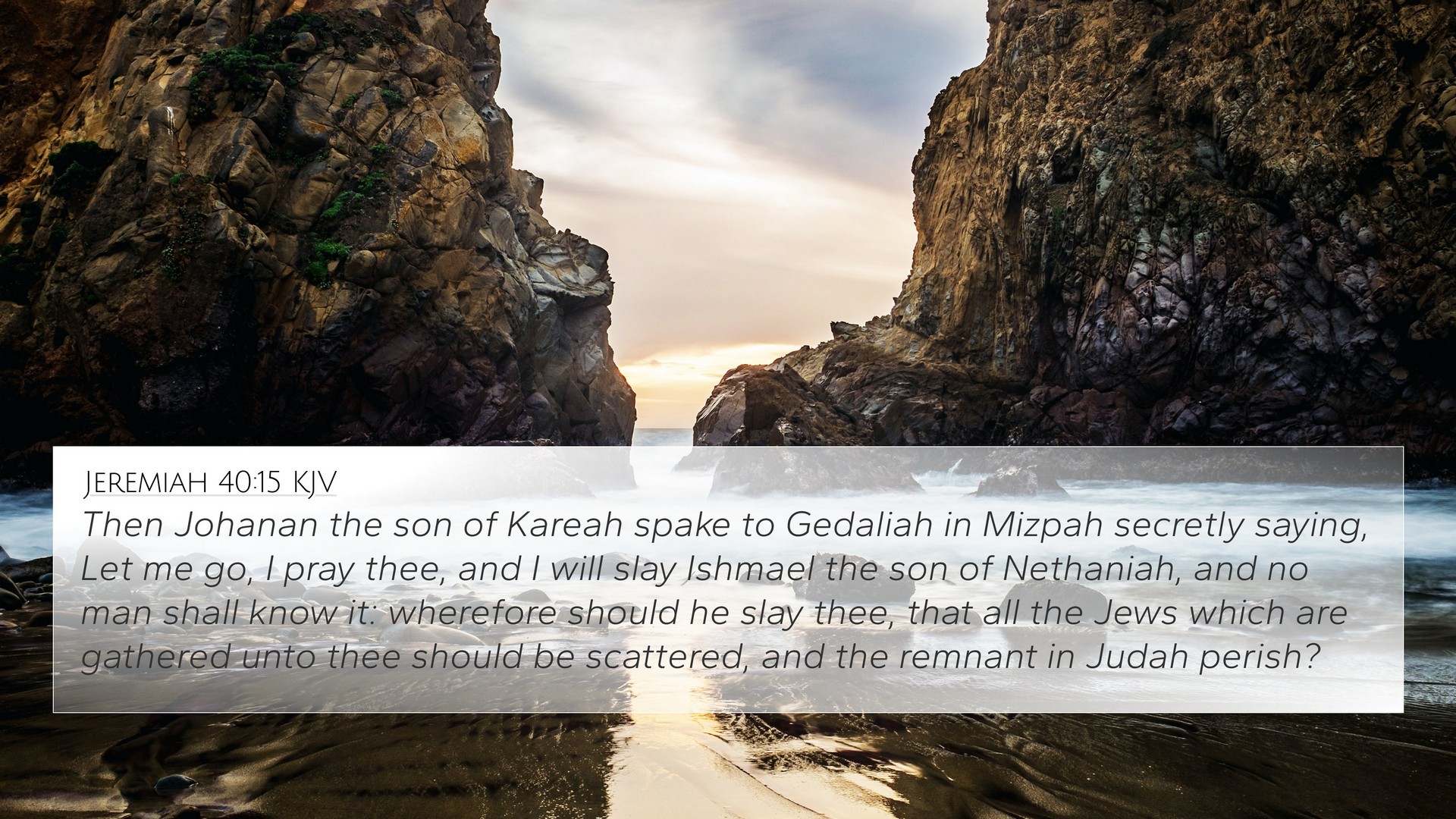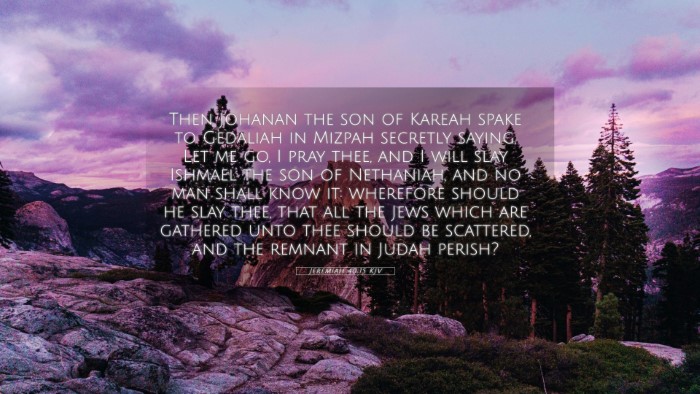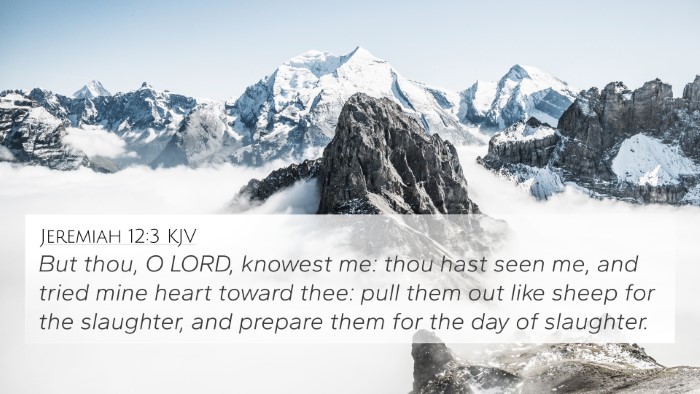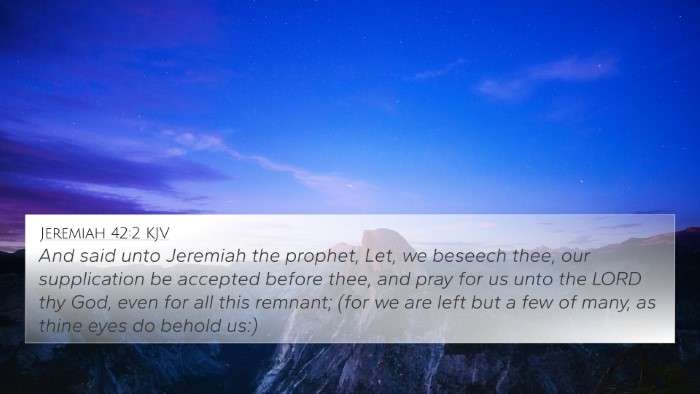Understanding Jeremiah 40:15
Jeremiah 40:15 reads: "Then Johanan the son of Kareah spoke secretly to Gedaliah in Mizpah, saying, 'Let me go, please, and kill Ishmael the son of Nethaniah, and no one will know.'"
Contextual Overview
This verse takes place after the Babylonian exile when Gedaliah, appointed by the Babylonians, is governing the remnant in Judah. The political tensions and fears of assassination reflect the desperate state of the people, indicating how precarious their situation was.
Verse Meaning and Insights
According to Matthew Henry, this passage portrays the urgency and complexity of the circumstances during this time. Johanan’s desire to protect Gedaliah from Ishmael's potential treachery underscores the chaotic atmosphere in post-exilic Jerusalem.
Adam Clarke elaborates on Johanan's character, indicating that he was a patriot concerned for Gedaliah's welfare. The suggestion to assassinate Ishmael demonstrates the level of mistrust and the fear of internal betrayal prevalent in the society after their return from exile.
Albert Barnes added that this moment illustrates a moment of political intrigue that reveals the fragility of Gedaliah’s rule. The plot to kill Ishmael indicates the larger theme of betrayal that permeates the narrative of Jeremiah. The actions of Johanan and Ishmael represent two opposing forces vying for control and power.
Thematic Connections
This verse can be linked to several thematic discussions within the Bible, particularly those concerning leadership, betrayal, and the preservation of God's people amidst adversity. It highlights key issues such as:
- Political instability and leadership in the Bible.
- The struggle against treachery and betrayal.
- The importance of vigilance among leaders in the face of threats.
Bible Verse Cross-References
Jeremiah 40:15 can be enriched by examining related scripture, highlighting thematic and narrative connections. Here are some significant cross-references:
- Jeremiah 38:1-6 - Discusses the plot against Jeremiah which echoes themes of betrayal.
- Jeremiah 41:1-3 - Continues the narrative of Ishmael’s treachery against Gedaliah and the aftermath.
- 2 Kings 25:25 - Speaks about the assassination of Gedaliah, drawing a direct line from Johanan’s warnings.
- Matthew 10:16 - Jesus advises His followers to be shrewd and vigilant, paralleling Johanan’s concerns.
- Proverbs 27:12 - "The prudent sees danger and hides himself, but the simple go on and suffer for it," which reflects Johanan’s cautious strategy.
- Isaiah 54:17 - "No weapon formed against you shall prosper," encourages trust in God amid treachery.
- Psalm 41:9 - "Even my own familiar friend in whom I trusted, who ate my bread, has lifted up his heel against me," correlating with the themes of betrayal.
Conclusion
Jeremiah 40:15 serves as a poignant reminder of the perilous nature of leadership during tumultuous times. The interactions between Johanan and Gedaliah reveal the intense dynamics of protection and betrayal, and the importance of listening to wise counsel. Cross-referencing this verse with others enhances our understanding of the broader biblical narrative about faithfulness, vigilance, and the complexities of human relationships.
Exploring Bible Cross-Referencing
To better understand the connections between Bible verses and themes like betrayal and leadership, one can utilize tools for Bible cross-referencing or a Bible concordance. These resources allow individuals to:
- Identify relationships and parallels in scripture.
- Conduct a comparative Bible verse analysis.
- Explore themes and develop deeper insights from interconnected verses.
Further Study Suggestions
If you are interested in studying the implications of Jeremiah 40:15, consider the following:
- Investigate how this passage correlates with New Testament teachings about vigilance in leadership.
- Look for cross-references that deal with the consequences of betrayal throughout scripture.
- Engage in a cross-referencing Bible study to find connections between Old and New Testament leaders.











